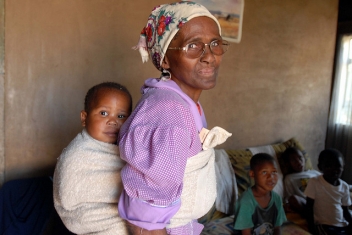 HelpAge International, with CEO Richard Blewitt and its affiliate HelpAge USA will be participating in the United Nations Commission on Social Development which kicks off on 1 February in New York.
HelpAge International, with CEO Richard Blewitt and its affiliate HelpAge USA will be participating in the United Nations Commission on Social Development which kicks off on 1 February in New York.
Older people are at the centre of the key themes of the meeting, such as poverty eradication, the Madrid Plan of Action on Ageing (MIPAA) and the social protection floor initiative, providing us with a great opportunity to highlight older people’s needs.
Despite this however, older people have been excluded in many of these discussions and in the language of the Millennium Development Goals (MDGs).
The right to be included
Older people have the right to be included in social development and this year provides many opportunities for us to work on protecting older people’s rights. 2012 is the tenth anniversary of MIPAA, which is a potential catalyst and guide for social development, the promotion of human rights and government responsibility for active ageing.
Ageing is the focus of World Health Day this year and WHO will also launch a global report on ageing and dementia. The first UN agency-sponsored global State of the World’s Older Persons report will be launched in October 2012 and will give voice to the experiences of disadvantaged older people from some 40 countries.
The MDGs only run until 2015. Therefore, a Post-MDG Task Force will assess next steps on global development goals and will begin to re-evaluate the MDGs. This provides an opportunity for the world to take note of population ageing and its effects on development around the world.
Here is how we will be working on behalf of older people in the developing world at the Commission on Social Development.
Recommendations on ageing to the CSD:
Exclusion
Older people are not explicitly referenced in the MDGs and are rarely included in development and poverty eradication policies and programmes. As a result, poverty in old age is not addressed. All future development goals should explicitly include older people.
Disempowerment in older age
People living in poverty have the least power to shape the policies affecting them and are frequently denied remedies for violations of their rights. Social development should be a powerful tool for empowerment, available throughout life.
Life of poverty
Protection from economic shocks including unemployment, pregnancy, widowhood, disability and ill health provide benefits for individuals, including older people, throughout their lives and supports households in the long term by tackling intergenerational poverty. Include intergenerational and old age poverty as a cause and outcome of poverty.
Non-contributory pensions
MIPAA recommends appropriate social security measures to reduce the proportion of people living in extreme poverty. Social security levels should enable people to enjoy an adequate standard of living and other rights, such as health, housing, food, water and sanitation. Participate in the social protection floor initiative and extend non-contributory pensions as a solution to poverty.
Collect and disaggregate data by age
Data gaps are unacceptable. Reductions in inequality and poverty cannot be measured without national data disaggregation by all ages, sex and disability. Include data disaggregation by all ages, sex, and disability to measure the reduction of inequality and poverty.
Invest in ageing
Realising older people’s right to social security in South Africa, for example, resulted in girls who live in households which receive a non-contributory pension to be 7% more likely to be enrolled full time in school than girls living in households without a pension. Recognise the important role older people play in addressing poverty.
Acknowledge the role of older women
Older women face the cumulative effects of lifetimes of discrimination. They have earned less than men, receive lower pensions because of time outside of the formal workforce and are more likely to be caring for and supporting other people in their old age. Older women’s lifetimes of cumulative discrimination, multiple discriminations and poverty must be directly addressed.
We’ll keep you updated on our progress.
What next?
- Read more about our work on older people’s rights
- Sign our Age Demands Action petition to support the rights of older people
